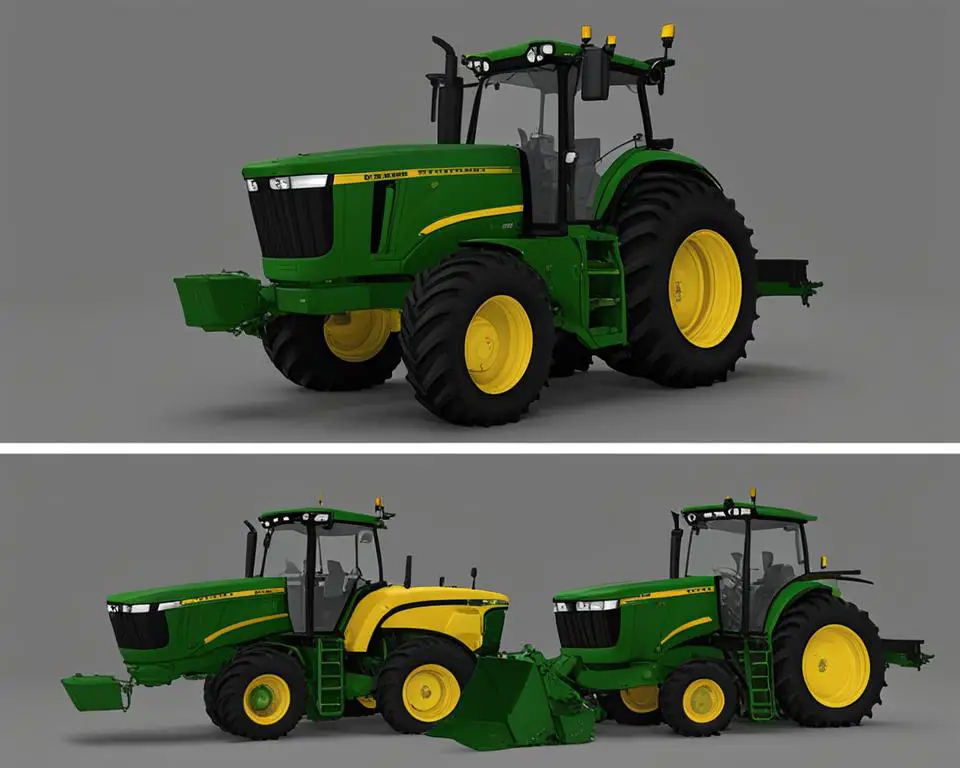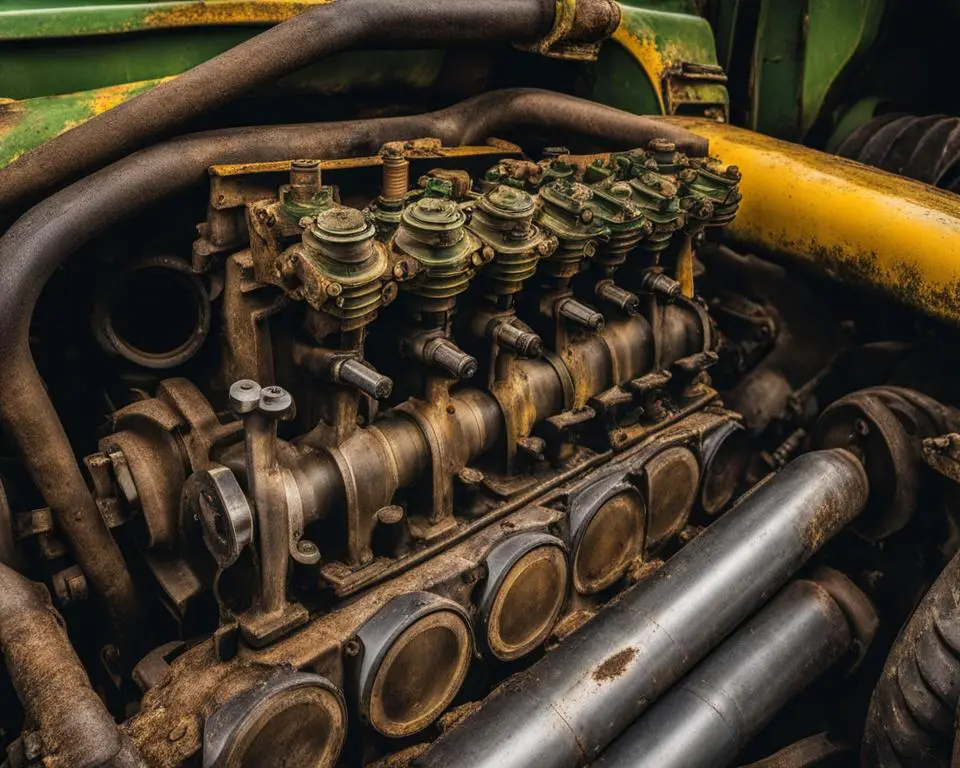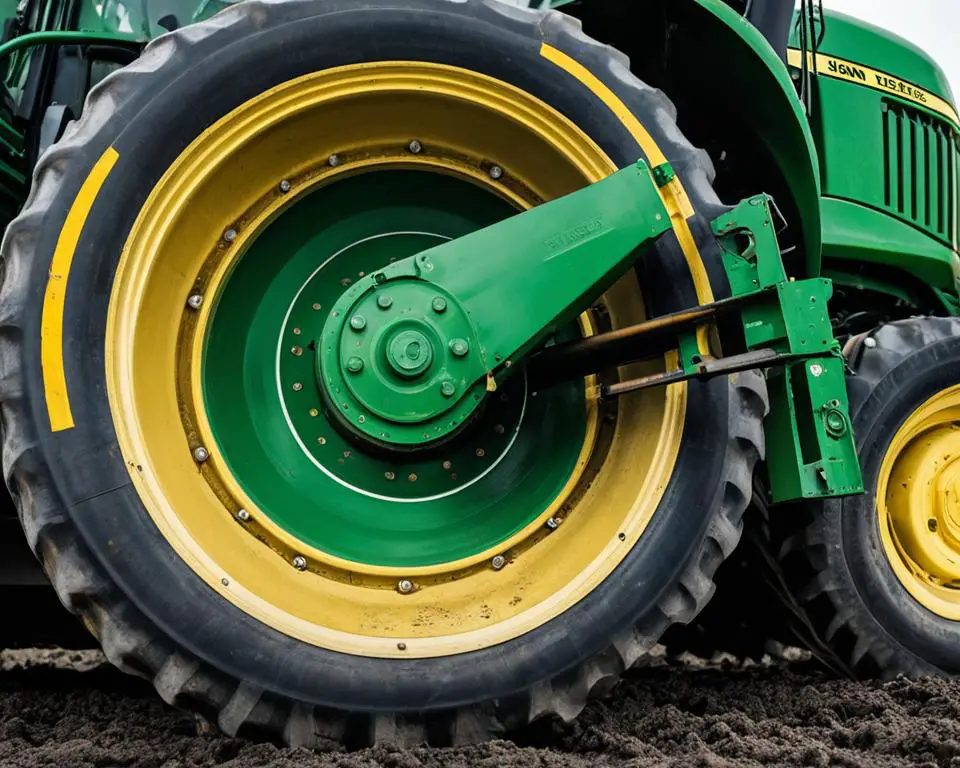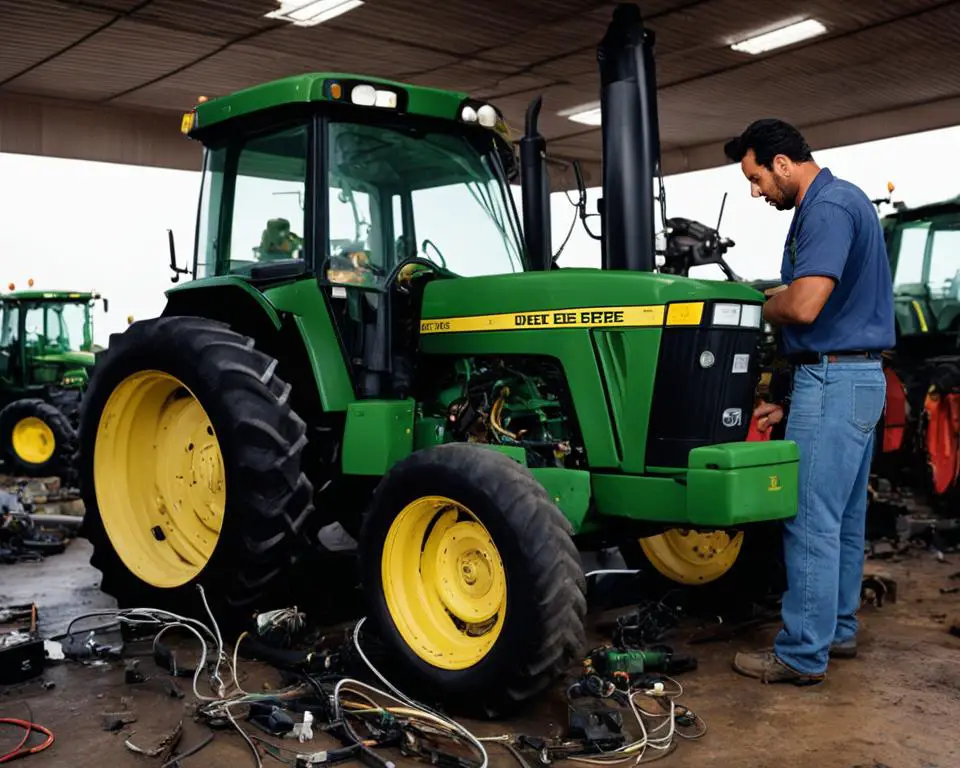Welcome to our comprehensive guide on common problems and fixes for the John Deere 7800 tractor. As experienced professionals in the field, we understand that troubleshooting machinery issues can be a challenging task. That’s why we have compiled a list of the most frequently reported problems with the John Deere 7800, along with effective solutions to help you maintain and optimize your tractor’s performance.
Owners of the John Deere 7800 have reported several common issues, including transmission problems, electrical malfunctions, 3-point hitch troubles, and engine to transmission driveline problems. These issues can hinder your tractor’s functionality and productivity, but with proper maintenance and repairs, you can quickly get your John Deere 7800 back in top shape.
In this article, we will delve into each problem area, providing detailed information on the symptoms, causes, and solutions. Whether you are facing transmission issues, electrical glitches, or difficulties with the 3-point hitch, our guide will equip you with the knowledge to troubleshoot and resolve these problems effectively.
By addressing these common problems and investing in regular maintenance, you can extend the lifespan of your John Deere 7800 and ensure its reliable performance for years to come. Let’s dive in and discover the fixes for your John Deere 7800.
Transmission Problems
One common issue with the John Deere 7800 is transmission problems, such as worn-out drivelines and broken transmission cases. The driveline can wear out over time due to heavy use, but it can be easily fixed. However, the right side of the transmission case can break if the tractor is put in park and gear at the same time, which is a more complicated fix. Regular maintenance and inspections are crucial to prevent and address these problems.
Electrical Issues
Electrical problems can also occur in the John Deere 7800. Some owners have reported issues with dash lights not illuminating, the tractor not moving when gears are engaged, and the PTO not working. These problems are typically caused by electrical malfunctions. Replacing computer components and switches can temporarily fix the issue, but it may occur again in the future. Proper diagnosis and repairs by a qualified technician are essential to solve these electrical problems.
Common Electrical Problems
- Dash lights not illuminating
- Tractor not moving when gears are engaged
- PTO not working
These electrical issues can have various underlying causes, including faulty wiring, malfunctioning sensors, or damaged components. Troubleshooting these problems requires a systematic approach to identify the root cause and implement the appropriate repairs.
Troubleshooting Electrical Issues
When faced with electrical problems on the John Deere 7800, consider the following troubleshooting steps:
- Inspect the wiring: Check for any loose or damaged wires that could be causing the problem. Ensure all connections are secure and free from corrosion.
- Test the battery: A weak or dead battery can lead to electrical issues. Use a multimeter to check the battery voltage and ensure it meets the manufacturer’s specifications.
- Check the fuses and relays: Faulty fuses or relays can disrupt the electrical system. Inspect these components for any signs of damage and replace as needed.
- Diagnose the switches and sensors: Faulty switches or sensors can prevent proper functionality. Test these components using specialized diagnostic tools and replace if necessary.
- Consult a qualified technician: If the issue persists or if you are unsure about performing electrical repairs, it is recommended to seek the assistance of a certified John Deere technician. They have the expertise and diagnostic equipment to accurately identify and resolve electrical problems.
By following these troubleshooting steps and seeking professional assistance when needed, owners of the John Deere 7800 can effectively address electrical problems and ensure the proper functioning of their tractor.
| Electrical Issues | Possible Causes | Recommended Solutions |
|---|---|---|
| Dash lights not illuminating | Failed light bulbs or wiring issue | Replace light bulbs or repair wiring |
| Tractor not moving when gears are engaged | Faulty transmission solenoid or wiring problem | Replace solenoid or repair wiring |
| PTO not working | Malfunctioning PTO switch or damaged wiring | Replace PTO switch or repair wiring |
Note: The troubleshooting steps and recommended solutions provided above are general guidelines. Individual cases may require additional diagnostics and repairs based on the specific symptoms and underlying causes of the electrical problems.
3-Point Hitch Troubles
When it comes to the John Deere 7800 tractor, owners have occasionally reported difficulties with the 3-point hitch, specifically with lowering. A common problem that arises is the lower pins becoming tight, leading to functionality issues with the hitch. Fortunately, regular maintenance and proper lubrication of the pins can help resolve this problem.

It’s important to address these 3-point hitch problems promptly to ensure smooth operation of the tractor. By regularly inspecting and maintaining the hitch, owners can prevent or resolve issues related to its lowering function. Let’s take a closer look at troubleshooting and resolving these 3-point hitch troubles.
Engine to Transmission Driveline Problems
Another common issue that owners of the John Deere 7800 may encounter is related to the engine to transmission driveline. This problem can manifest as a rumbling noise at idle or excessive play in the driveline, causing concern for tractor operators. To address these driveline issues, it is recommended to perform a thorough inspection of the u joints and yoke, as they can often be the source of the problem. If any signs of wear or damage are identified, replacing these components may be necessary to resolve the driveline problems effectively.
In addition to inspecting the u joints and yoke, it is crucial to be aware of other warning signs that may indicate driveline problems with the John Deere 7800. Chatter or unusual noises coming from the splined shaft, as well as a rumbling sound at idle, are potential indicators of driveline issues. It is important to note that low engine idle or an engine idle below 750 rpm can contribute to chattering noises and should be addressed promptly to prevent further damage.
Maintaining the engine to transmission driveline is a crucial aspect of tractor maintenance. Regular inspections, proper lubrication, and prompt repairs are key to ensuring the driveline remains in optimal condition and avoiding any potential driveline problems that may arise during the operation of the John Deere 7800.

MFWD Disengagement and Exhaust Bend
Some owners have reported issues with the MFWD (Mechanical Front Wheel Drive) disengaging on the John Deere 7800. This can be a frustrating problem, as it affects the tractor’s ability to properly distribute power to the front wheels, impacting its traction and overall performance. Thankfully, troubleshooting and resolving this issue is possible.
Troubleshooting MFWD Disengagement
The first step in troubleshooting MFWD disengagement is to examine the o-rings and solenoid. Over time, these components can wear down or become damaged, resulting in the disengagement problem. Inspect the o-rings for any signs of wear or deterioration. If they are damaged, replacing them should solve the issue. Additionally, check the solenoid for any defects or malfunctions. A faulty solenoid can prevent the MFWD from engaging properly. Replacing the solenoid may be necessary to restore normal function.
Exhaust Bend Concerns
In addition to the MFWD disengagement problem, some John Deere 7800 owners have encountered issues with the exhaust bend near the cab. This component is prone to developing weak spots, which can lead to potential fires. Regular inspection of the exhaust bend is essential to identify any signs of wear or damage. If weak spots or cracks are present, it is crucial to update the exhaust bend promptly to mitigate the risk of a fire hazard.

Proper maintenance of the MFWD system and regular inspection of the exhaust bend are vital preventive measures. By addressing these issues proactively, tractor owners can ensure optimal performance and safety while operating their John Deere 7800.
Hours and Tractor Age
The number of hours on a John Deere 7800 can vary greatly depending on usage and maintenance. While some owners have reported relatively low hours on their tractors, others have mentioned higher hour counts, ranging from 5,000 to 14,000 hours. It is important to consider the overall condition of the tractor when evaluating its lifespan. Proper maintenance and regular inspections can help extend the life of the John Deere 7800.
| Hours on John Deere 7800 | Tractor Age |
|---|---|
| Low Hours (range) | Newer tractors with less wear and tear |
| High Hours (range) | Older tractors with more usage |
Conclusion
The John Deere 7800 is a highly regarded tractor known for its reliability and durability. However, like any machine, it is not immune to problems over time. Owners have reported common issues such as transmission problems, electrical malfunctions, troubles with the 3-point hitch, and engine to transmission driveline problems.
In order to ensure the longevity of the John Deere 7800, regular maintenance, thorough inspections, and prompt repairs are crucial. By addressing these problems proactively, owners can prevent further damage and maximize the lifespan of their tractor.
It is also important to consider the age and overall condition of the John Deere 7800 when evaluating its value and reliability. Older tractors may require more frequent repairs and maintenance, while newer models in good condition may have fewer issues.
In conclusion, while the John Deere 7800 is a solid tractor, it is essential for owners to stay proactive in addressing common problems and maintaining their machine. By doing so, they can extend the lifespan of their John Deere 7800 and ensure that it continues to perform at its best.
FAQ
What are some common problems with the John Deere 7800?
Some common problems with the John Deere 7800 include transmission issues, engine to transmission driveline problems, electrical issues, and difficulties with the 3-point hitch.
How can transmission problems with the John Deere 7800 be fixed?
Transmission problems such as worn-out drivelines and broken transmission cases can be fixed with proper maintenance and repairs. It is important to regularly inspect and address these issues to prevent further damage.
What can cause electrical issues in the John Deere 7800?
Electrical issues in the John Deere 7800 can be caused by malfunctions, resulting in problems such as dash lights not illuminating, the tractor not moving when gears are engaged, and the PTO not working. These issues typically require the replacement of computer components and switches, but proper diagnosis and repairs by a qualified technician are crucial.
How can difficulties with the 3-point hitch on the John Deere 7800 be resolved?
Difficulties with the 3-point hitch, particularly with lowering, can be resolved through regular maintenance and proper lubrication of the lower pins. It is important to ensure the pins are in good condition to maintain the functionality of the 3-point hitch.
What are some common engine to transmission driveline problems in the John Deere 7800?
Some common engine to transmission driveline problems in the John Deere 7800 include rumbling noise at idle and excessive play in the driveline. It is recommended to inspect and replace u joints and yokes as needed. Chattering noises and rumble at idle can be early indicators of potential driveline problems.
How can issues with MFWD disengagement and the exhaust bend be addressed?
Issues with MFWD disengagement can often be resolved by replacing o-rings or the solenoid. It is also important to inspect and update the exhaust bend near the cab to prevent potential fires. Regular inspection and maintenance are key to addressing these issues.
How many hours can a John Deere 7800 last?
The number of hours on a John Deere 7800 can vary greatly depending on usage and maintenance. Some tractors have relatively low hours, while others have hour counts ranging from 5,000 to 14,000. It is important to consider the overall condition of the tractor when evaluating its lifespan.
What is the conclusion regarding the John Deere 7800?
The John Deere 7800 is generally considered to be a solid tractor, but it can experience various problems over time. Transmission issues, electrical malfunctions, 3-point hitch troubles, and engine to transmission driveline problems are common among owners. Regular maintenance, inspections, and prompt repairs are essential for addressing these issues and maximizing the lifespan of the John Deere 7800. It is also important to consider the tractor’s age and overall condition when evaluating its value and reliability.

Leave a Reply